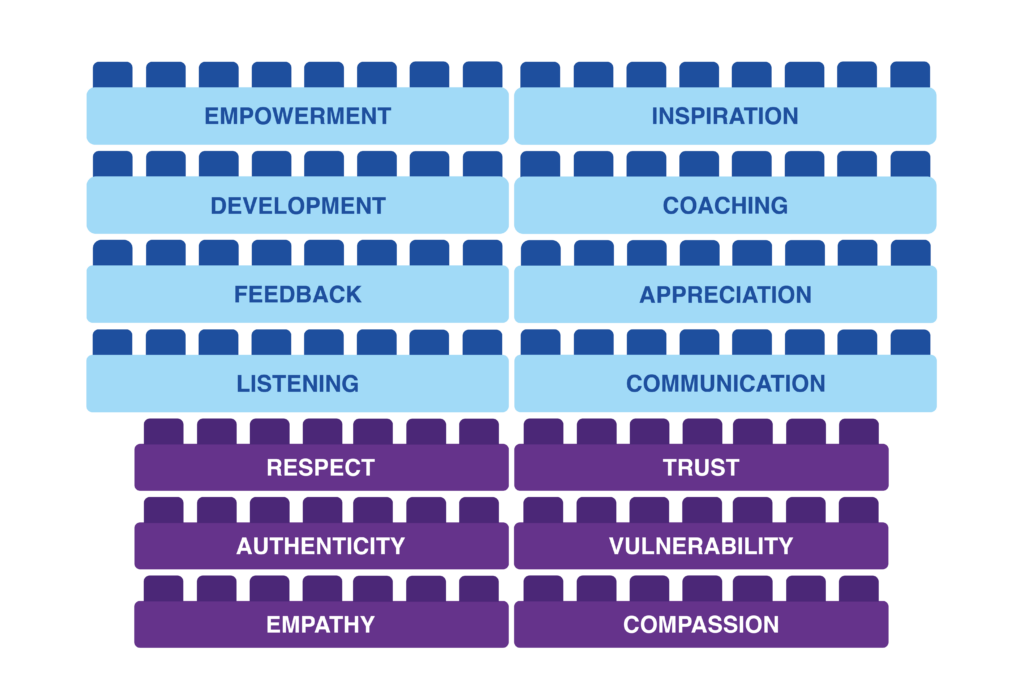For many athletes, six-pack abs are a coveted goal. They train and diet for it and put in the effort it takes to attain this badge of honour. But what you may not know is that a six-pack can do far more than just give you a fit appearance. A six-pack, a strong core, can improve performance, protect your body, and prevent injury. All are critical so that an athlete can be resilient and perform at their best.
These concepts of performance and protection are also important for bosses. Although they’re not being asked to run a marathon, throw the javelin or compete in a 100 metre race in a pool, bosses face their own set of challenges and need their own version of a six-pack.
With this in mind, we built a six-pack into our Great Boss Building Block™ Model, using them as the core, the foundation, to go along with the eight connecting blocks of the model. These six building blocks represent behaviours and mindsets required to be a great boss. They work together to support and drive performance and resilience.

Let’s look at each of them:
1. Empathy
The first building block in the six-pack is empathy, which focuses on your ability to understand what another person feels. In practice, it means that you understand their unique needs and challenges at a professional and personal level. And at the same time, you relate to their emotions, experiences and perspectives.
The case for empathy in the workplace has only grown in importance over the years. We’ve come to see the need to connect with our people at a deeper, more human level, showing empathy to support their individual and diverse needs. Empathy has become a business tool and a business imperative, with studies showing it is an important driver of outcomes such as innovation, engagement, inclusion and employee wellbeing.
2. Compassion
Working alongside empathy is compassion, which focuses on action, taking a step to move past empathy by taking the appropriate action(s). I like to put them together because empathy is the fuel, and compassion is the spark, so you need them both working together.
Compassion is about taking a human approach to how you lead, putting your people first by showing kindness and understanding towards them, particularly in difficult times.
Compassionate bosses listen to their people and take action to support them when they face challenges or setbacks. They offer their people encouragement and show flexibility and understanding in accommodating and supporting their personal and professional needs.
According to research by Rasmus Hougaard and Jacqueline Carter, cited in their book Compassionate Leadership, employees who work for compassionate leaders are 25% more engaged in their jobs, 20% more committed to their company, and 11% less likely to burn out.
Vulnerability is now an expectation and a necessity.
3. Authenticity
I like to describe the next two building blocks as things you ‘wear’, with authenticity being the first layer. It’s where you determine and display to others who you are, what you believe in, and what is your true self.
The other building blocks require outward courage, e.g. I’m going to courageously show empathy, compassion, to my people. But this building block, along with the vulnerability building block (up next), require inward courage. Instead of showing something towards another, it’s about showing yourself to them, which is a new level of courage.
According to research by Sher Khan and Bashir Muhammad, authentic leadership results in higher levels of employee engagement and satisfaction.
4. Vulnerability
Vulnerability takes it to that next level, putting on that next layer to allow yourself to act in your most authentic way. It’s where you reveal your true self, the full spectrum, including your emotions, struggles, and imperfections. This second layer is the one that is often hidden, as many of us believe that only the first layer is safe enough to show to others.
As the world around us changes, throwing us challenge after challenge, vulnerability has become part of the conversation and is seen as a fundamental business imperative. And with new generations entering the workforce, ones who share their every emotion, action and challenge, vulnerability is now an expectation and a necessity.
Showing genuine and meaningful respect to your people can deliver enormous benefits and returns.
5. Respect
The final two six-pack building blocks involve ‘beliefs.’ Respect is about believing in the value of a person, while trust is believing that they’ll do the right thing.
Drilling down a bit deeper, respect involves feelings of admiration towards someone. You recognise their value, abilities, and contributions and treat them with dignity and courtesy. You’re willing to listen to their different opinions and perspectives without judging or criticising them, and you treat them with kindness and consideration, showing interest in their thoughts and feelings.
Showing genuine and meaningful respect to your people can deliver enormous benefits and returns. And that’s because employees who feel respected are more satisfied with their jobs, more motivated, and more loyal to you and your company.
6. Trust
And finally, trust is the belief or confidence in the honesty, integrity and reliability of someone. When you trust your people, and they trust you, you have this belief that they will act in your best interest and do the right thing, making you feel safe and secure with them.
According to the Edelman Trust Institute, an organisation that has been surveying trust for more than 20 years, trust is the ultimate currency. Its latest report states: “Trust is the foundation that allows an organisation to take responsible risk and, if it makes mistakes, to rebound from them. For a business, especially, lasting trust is the strongest insurance against competitive disruption, the antidote to consumer indifference, and the best path to continued growth. Without trust, credibility is lost, and reputation can be threatened.”
From awareness to practice
Now that you’re aware of the six-pack building block, the next challenge is to encourage your bosses to use them as ways to build strong and resilient relationships with your people, helping them and your business succeed.
Interested in this topic? Read Leadership development: Moving from good to great









